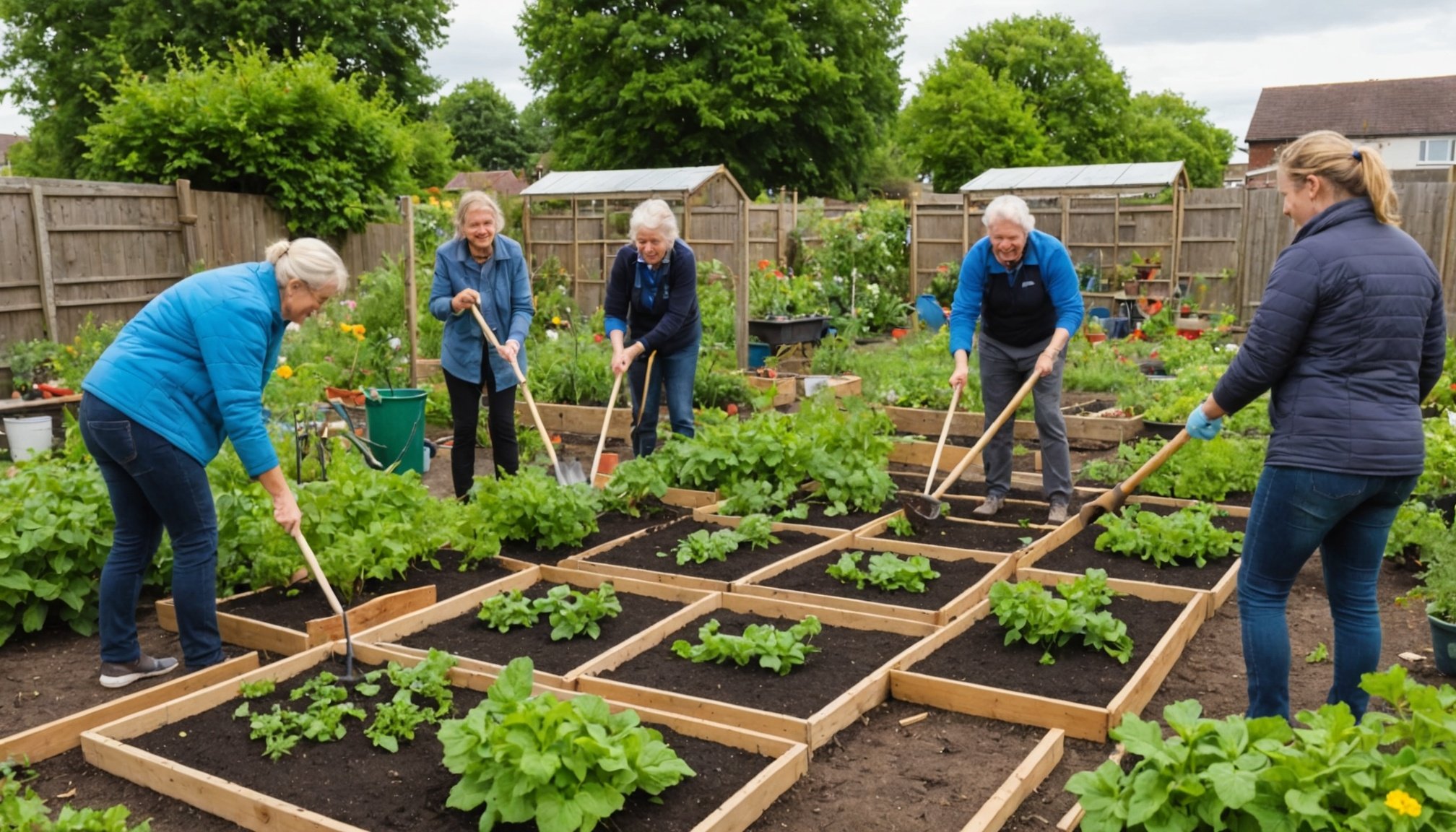The Impact of Community Gardening on Mental Health
Engaging in community gardening has been shown to significantly enhance one’s mental well-being. Numerous studies link these gardening activities with improved mental wellness, highlighting the reduction in stress and anxiety levels among participants. Individuals partaking in gardening often experience a natural happiness boost as they immerse themselves in nature and the rhythmic tasks it involves.
Gardening itself involves physical activities such as planting, watering, and weeding, which play a crucial role in mood enhancement. These actions not only serve as a form of exercise but also release endorphins, the body’s natural mood lifters, thereby contributing to overall mental health benefits. This form of exercise does not require high-intensity workouts but instead provides a gentle, yet effective, physical outlet.
Additional reading : Enhancing social connections: how pet-assisted therapy empowers children with autism
Moreover, the sense of accomplishment that comes from watching plants grow can profoundly affect one’s psychological state, leading to a boost in self-esteem and positive feelings. By spending time outdoors and connecting with nature, individuals often experience a calming effect, counteracting the challenges posed by modern fast-paced lifestyles. Engaging regularly in such activities could foster resilience against stress-related disorders, making community gardening an invaluable tool for enhancing mental wellness.
Benefits of Community Involvement through Gardening
Engaging in community gardening not only offers personal mental health benefits but also helps cultivate meaningful social connections. For many, these gardening experiences act as a platform for forging friendships and receiving emotional support within their community. Such communal activities are integral in building robust social networks, providing gardeners the chance to interact, share experiences, and work collaboratively towards common goals.
Also read : Discovering relief: the benefits of tailored aquatic therapy for those battling chronic back pain
Through personal anecdotes, individuals frequently highlight the friendships and support systems developed in the garden. A shared interest in gardening fosters conversations and bonds among participants, leading to improved emotional well-being. For instance, community gardening allows people to meet regularly, creating an environment where they can share personal challenges and receive empathy from fellow gardeners.
Research supports the idea that participating in gardening activities enhances emotional stability by reducing feelings of isolation and loneliness. Engaging with others in a community garden setting cultivates a sense of belonging and purpose. This shared work and interaction present opportunities to learn from diverse perspectives, leading to increased inclusivity and understanding among the community members. Ultimately, community gardens serve as a space not just for nurturing plants, but also for nurturing relationships that contribute to one’s overall emotional wellness.
Tips for Starting or Joining a Community Garden
Establishing or becoming part of a community garden can be a rewarding endeavor. Whether you’re starting from scratch or hoping to integrate into existing garden groups, here are some useful insights.
Finding Local Community Gardens
To locate nearby gardens, begin by exploring online resources dedicated to community gardening or checking local community centers and libraries. They often maintain lists of garden groups looking for new participants. Additionally, social media platforms are excellent for pinpointing community gardening activities in your area.
Necessary Steps to Start Your Own Garden
Initiating a community garden requires careful planning. Begin by determining a suitable location, ideally with plenty of sunlight and good soil. Obtain necessary permissions from local authorities and, if needed, seek advice from established gardeners. Create a budget and plan for tools, seeds, and other essentials. Enlist volunteers to share responsibilities and ideas.
Tips for Engaging with Members
To foster healthy social dynamics, promote open dialogue and inclusive decision-making. Encourage members to share personal gardening tips and experiences. Organize regular meetings and collaborative projects to strengthen community bonding. Celebrating small successes, like harvest milestones, can enhance group spirit and commitment.
Insights into Social Dynamics in Community Gardens
Community gardening thrives on fostering social dynamics that encourage relationship-building through shared experiences. When individuals engage in collaborative gardening tasks, they experience a unique form of interaction that strengthens community bonding. This collective endeavour goes beyond tending to plants; it cultivates friendships and a sense of shared purpose.
The environment of a community garden serves as a melting pot of different backgrounds, promoting inclusivity and diversity. Conversations flourish over rows of carrots and lettuce, bringing together a tapestry of perspectives and stories. This shared space allows for a seamless blending of cultures and ideas, enriching the community fabric. The bonds formed in this context enhance mutual understanding and respect among members.
Moreover, the psychological benefits of teamwork and shared responsibilities in gardening cannot be understated. Participants often find joy and satisfaction in contributing to a common goal, which positively impacts their mental health. The structured yet flexible nature of gardening tasks ensures everyone can contribute, fostering a deeper connection and a sense of accomplishment. Ultimately, this collaborative atmosphere nurtures a supportive social network crucial for emotional well-being.
Conclusion of Research and Findings
Research findings consistently highlight the substantial community gardening benefits concerning mental wellness. Studies illustrate that engaging in these activities not only supports individual well-being but also reinforces community bonds and social support networks. Such positive interactions foster an inclusive environment conducive to personal growth and emotional support.
Key findings indicate that gardening offers a pathway for reducing stress and enhancing happiness. Participants repeatedly report feeling a sense of accomplishment and belonging, which are crucial for mental health. Furthermore, the involvement in community gardens cultivates resilience against stress, offering a proactive approach to mental wellness.
The future of community gardening initiatives looks promising. By focusing on expanding access and encouraging diverse participation, there’s potential to increase these benefits across wider community segments. These efforts may contribute significantly to addressing mental health concerns, particularly in urban areas.
For individuals seeking to enrich their lives and community ties, actively engaging in community gardening presents a meaningful opportunity. It is a win-win situation that nurtures both personal joy and community health. By experiencing the satisfaction of this collective endeavor, individuals can achieve a sense of purpose and enhanced mental well-being.

